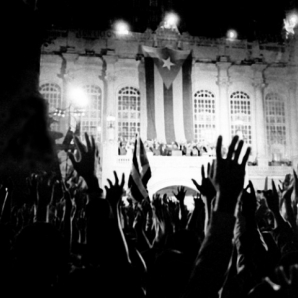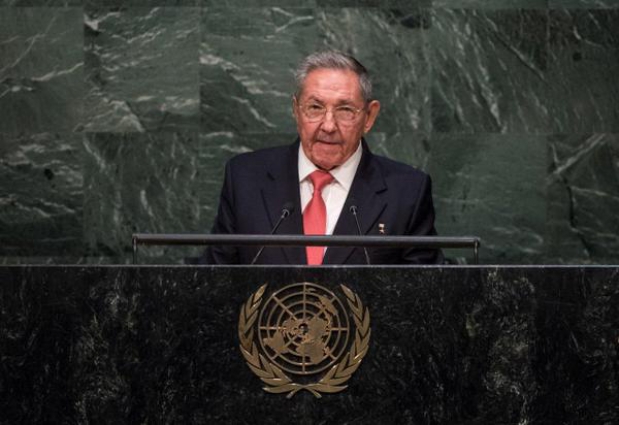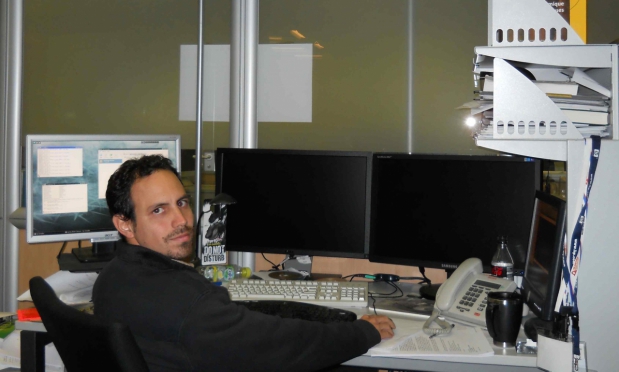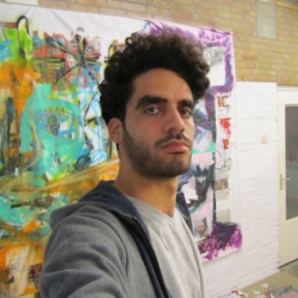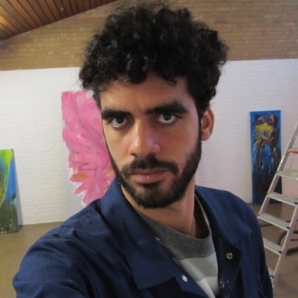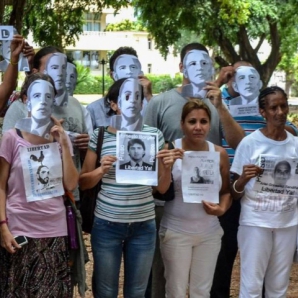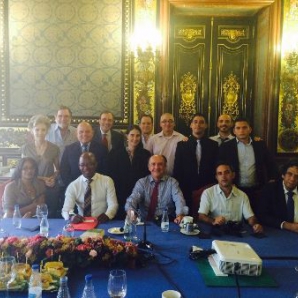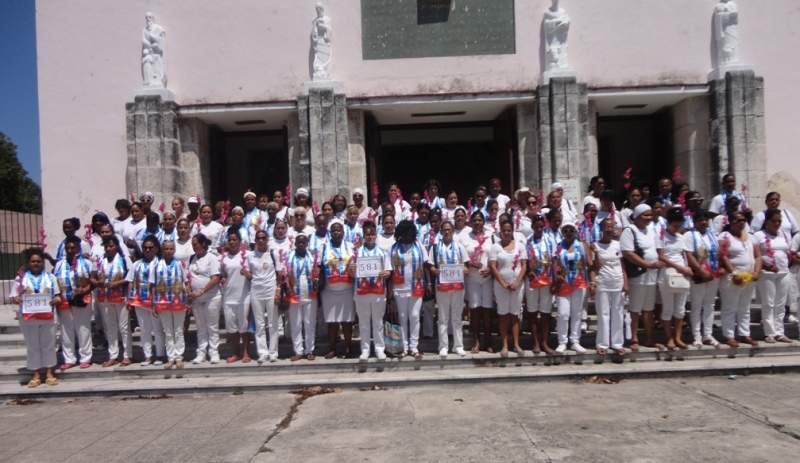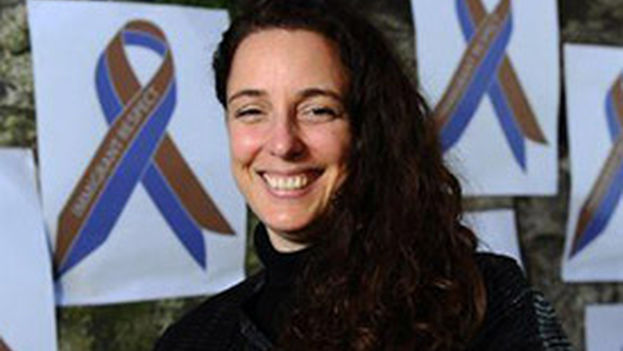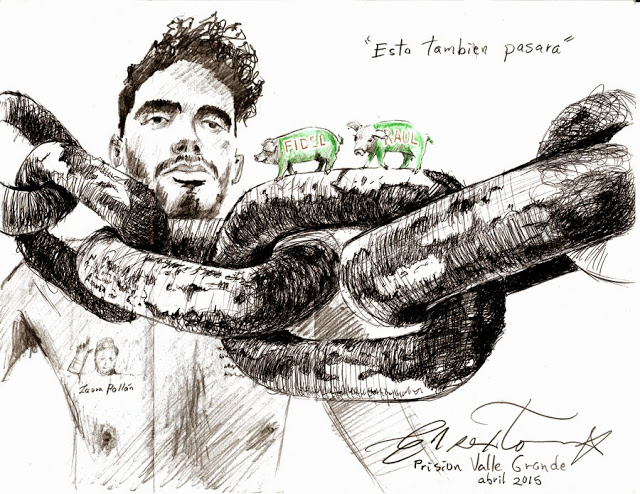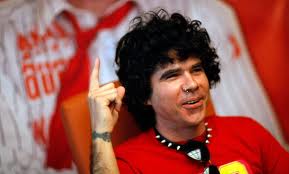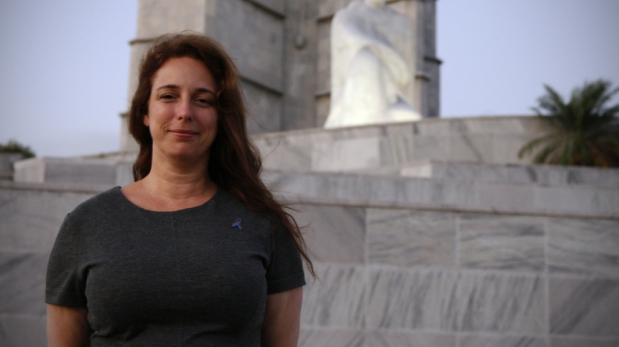
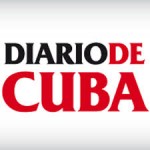 Diario de Cuba, Joan Antoni Guerrero Vall, 4 October 2015 — After being held in the country for eight months by the regime, in punishment for attempting to bring her performance Tatlin’s Whisper to the Plaza of the Revolution, Tania Bruguera refuses to give in. She recognizes that even when she was put in the cells at Vivac with Cuba’s repressive machinery fuming to put an end to her freedom of expression, she was happy because she felt herself to be free. She acted according to her principles, despite any action the regime took against her.
Diario de Cuba, Joan Antoni Guerrero Vall, 4 October 2015 — After being held in the country for eight months by the regime, in punishment for attempting to bring her performance Tatlin’s Whisper to the Plaza of the Revolution, Tania Bruguera refuses to give in. She recognizes that even when she was put in the cells at Vivac with Cuba’s repressive machinery fuming to put an end to her freedom of expression, she was happy because she felt herself to be free. She acted according to her principles, despite any action the regime took against her.
In a conversation with Diario de Cuba from New York, the artist recounts these days, speaks about the present and future of Cuba, and considers that the Cuban people have a lot to learn: “We need to help people to understand the happiness produced by things you believe in.”
After eight months in Cuba, what are the lessons you take away from everything that happened?
I’m still processing a lot of things. I learned that the image of the Revolution is one thing and how it is sustained is something else all together. There is an extraordinary dichotomy between the image of the Revolution and living with it. I also learned that the words we use, such as “solidarity” and “camaraderie,” have lost all meaning. The Revolution has used them indiscriminately and they have been emptied of their emotional functionality, in terms of humanism and activism. continue reading
And what meaning have these words taken under the current system?
I think I had the good fortune to understand solidarity and camaraderie: to believe in the truth of your own principles. In Cuba, we spend our lives saying slogans that we repeat and that have no meaning. They are like a rhetorical construction. They are not even constructions to call to action, in fact they don’t want you to really think about them.
What did the attempt to stage Tatlin’s Whisper in the Plaza of the Revolution teach you?
In this work I’ve done nothing more, and it what I am most satisfied with, that it presents a revolutionary ethic and attitude. I have activated all the concepts and slogans to become part of history, the whole idea of having principles, everything they tell us that, in reality, they don’t let us act on.
In this sense I learned that words are not actions. We Cubans have the right to participate in the history of Cuba. It is a right that has been taken by the Government. This learning is a personal process all Cubans pass through.
What brought about the change?
I came to Cuba knowing what freedom is because I live in freedom. At the beginning, when I left Cuba, it was a huge lie. Because on leaving Cuba everything is a lie: you have to lie about your feelings, your ideas, lie about what you really want in life.
To speak the truth in Cuba is dangerous. It cost me great personal labor and great discipline to understand the value of truth, of experiencing saying it. I still have to be careful, although I have spent hears being a person who doesn’t lie and talking to people who don’t lie.
Because of this I stopped talking to State Security agents. I would like it if people in Cuba could experience how good it feels when you are doing things you believe in, being honest, speaking the truth for once in your life.
Was it difficult being in jail?
It was very difficult, but at the same time I had no problem because I had a much stronger sense of happiness because I said what I thought instead of what they tried to make me do. It is a very rare thing. I learned that injustice has a physical manifestation. You feel it in your body. So I believe that the Cuban body is numbed by the injustice it has had to bear for years. The blood is numb, it is something that is passed down from parents to children. Fear in Cuba is in the social DNA and that is what we must eliminate.
And how can that be done?
We have to make people understand the happiness that comes from doing things you believe in. My emotional spectrum is much broader now: I learned things that I still don’t know how to explain.
I learned that the country has to change and that it can’t continue like this. The Cuban government has the custom of projecting Cubans as a happy people. And how do they demonstrate this happiness. Because there is a lot of sex, beaches and laughter. But this isn’t happiness, without know that one is honest with oneself. This is what is missing in Cuba.
I want to continue working for it. I learned that art can be a part of history and of participating in an event on a higher scale, beyond the exposition. I greatly enjoyed how everything happened.
Has your perception of the country changed? Any disappointments or surprises?
I always tried to understand who benefitted most from what I did. I was under a lot of pressure to speak badly of artists who didn’t support me. If my project is about freedom of expression, I don’t have the right to judge other artists. If I advocated for the coexistence of differences, I can’t judge those who think differently.
I harbor no anger against absolutely anyone, I have no personal problem with any Cuban artist, whatever position they take. I believe this is a very complicated issues, from many points of view, and nor does political art in every country support it.
I also realize that, being in Cuba, there was a lot of underground work, pressuring me to speak ill of the artists.
By whom?
It could be a Government strategy to support them in isolating my community even more. I know that my separation from the artists’ union was orchestrated by State Security. There were people who received visits from State Security. They told them I was working for the CIA and that if they went to the Havana Biennial and someone asked them about my case, they should say they didn’t know anything about what was going on with me.
They told every person a different story. I have faith and I know it will change. I know Cuban artists are going to join the fight for freedom of expression because art is finding personal freedom. Under all the pressure that came from State Security, the curators, the director of the biennial, there were a lot of people who supported me, perhaps not all of them publicly and person a person helps you by offering you their shoulder, they can help you see the light about something that you’re doing that they think you shouldn’t do.
I love artists very much and they sit down to share ideas with me. I know I’m not alone and that the community of artists in Cuba supports and respects me. Everyone has their time. I think that we have to respect the personal process of each person. I don’t think it’s healthy to force anyone to make a decision when they’re not prepared to make it.
Is Tatlin’s Whisper already a closed action? Are you finished with it with your departure from Cuba? Is it possible there will be new attempts and you will continue challenging the authorities of the island from art?
That depends on State Security, not me. For me, Tatlin’s Whisper is a work of art of conduct. The significance fo the work is in how people conduct themselves. The fact that some people were in the Plaza is a part of the work.
The Cuban Government wants to appropriate for itself all authority through State Security. It is what they always do. Many people say I already knew what would happen. What I knew is that it was a historic moment. In those moments things didn’t function in the same way as always, things could change the meaning. People were outside their comfort zone and reacted in unexpected and different ways. I had this element in my favor.
As an artist, the Plaza of the Revolution seems to me to be a place that is exhausted, an ugly place in the sense that its meaning is very closed. I had thought of a Plan B, of doing it in other places. But after everything that happened around asking permission and I saw everything develop all around me, the art work set aside and the entire Cuban system of repression and control of the masses put on full alert. Then the Plaza of the Revolution took on another significance: it is not a people’s place, it is the center of power, the buildings surrounding it are places where they create the strategies of repression. So it was the place to stage the performance. In that moment I thought it was the place I had to do it.
Throughout the months you have been in Cuba the “thaw” process has continued. There is an evolution toward models of authoritarian capitalism. Do you believe the Government will manage to insert itself into the international community with these “particularities”?
The problem we have in Cuba is the arrogance of the people who are in power. They believe they are the only ones who have the answers to what happens in the country and the only ones capable of fixing what is happening. This is the first problem we have in the country.
The second is that we are going through a transition in which the people are not given a chance to participate, they are converted into receptors of orders. It’s like what you would say to a small child, “This is best for you.” Well, maybe not.
In the model they are following in Cuba — capitalism, feudalism, or what they are inventing — they are giving a disproportionate priority to the economy as the solution to the human problems we Cubans are suffering. I have heard many people, in the opposition and others, who agree that private businesses and creating a strong middle class will resolve the problems. I don’t agree with this.
Yes, there should be an economic blossoming, because the people deserve it, but I believe that the middle class, without a civic education, could be as reactionary a caste as the leaders of today’s Cuba are. Why? Because what it happening is that the egotism of those who have power will be spread a little more.
The Cuban people are a traumatized people, abused, they don’t know what they feel because they haven’t escaped from it. The first thing that has to happen is a massive civic literacy program in the streets so that those who know how to read and write learn to understand what they feel and to express themselves. The second is the Constitution: it has to be changed, but by whom. The new Government? A group of intellectuals?
What has to change is the people. I would love to see a system like in Iceland, where the people were directly involved in the changes. I think it is very dangerous to transition from ideology as truth to money as truth. Now the Cuban people deserve explanations, not orders, they deserve the ability to ask questions have the right to get an explanation and to have their doubts about this explanation and to be respectfully responded to.
How do you see Cuba today and the role of self-employment which some consider the germ of other changes?
With everything that is going there, there has been no improvement in democracy in Cuba. The owners of the new businesses are reproducing in the most intense way the social injustices of the Government. There is no protection for workers in private businesses, there is a reproduction of the mistreatment… you have been abused and now it is your turn to abuse.
I don’t know to what extent the middle class has a social and national conscience, or if it is rather a logical response to this spiritual and economic hunger that they have had for 50 years.
Another question is who can start these businesses, people who have family in the Government or family abroad. It is false that businesses in Cuba are free, they are blackmailed politically.
And what does this context portend for the world of art. We recently saw the censorship of The King is Dying…
The strategies of artists from the ’90s, speaking their demands obliquely and metaphorically and using displaced geographic examples to make a connection and to speak about their immediate reality are exhausted. Artists have the opportunity to present what is happening but not to question the cause of everything we are experiencing. No one can make a movie that explores the reasons for the problems.
Their treatment of Juan Carlos Cremata was abuse because it would have been enough to censor his work. But I think it is very important to understand why they took away his institutional right to do theater. They have such a huge fear that they are going to lose control in this transition that they can’t stop and they can’t fix. They are doing what they can to maintain control. They are looking for scapegoats so that the rest of the artistic community will get the message. They are afraid.
Do you think there will be obstacles for you to return to Cuba? On your departure you had a visit with an agent in the airport…
I did everything I needed to do so they would let me return to Cuba. It took me a month and a half to get them to give me a letter where it says my case is dismissed. They do everything illegally. Within six months they closed the case because after that they have to ask for special permission from the Ministry of Justice to continue with the investigation. They took it to the limit.
According to all the lawyers I saw, they have not one single reason not to let me enter Cuba. My only passport is Cuban, I have not renounced my residence in Cuba and I have never engaged in illegality. If when I decide to return to Cuba the government of the United States is still negotiating issues of human rights with Havana, I think they will let me enter to demonstrate that I was wrong and that I had an unfounded fear and to show the Americans that they are not so bad.
If they want to know something. if they need to find something out through an interrogation, that is another reason to let me in. When I return I have no intention of speaking to State Security again because on this trip they came to my house trying to change the way I think. I am taking advantage of this interview with Diario de Cuba — because they read it — to tell them that I am not going to speak with them again because they lied to me, they told me they would free El Sexto on 24 August and he is still a prisoner. And I have said that I do not speak with liars.
Another thing that can happen is that if when I return they feel secure and that they have gotten what they want from the United States, they might not let me enter.
Finally, what would be the best actions to advocate for an inclusive and democratic Cuba?
First, a massive civic literacy campaign. People have to learn that they have something to give and that things can change. What has to happen then is that the Government releases all the political prisoners.
We should enter into an absolutely democratic process where people express the vision they have for the country and hold a kind of referendum about where the Cuban people want to go. Of course, all this derives from a constitutional change.
I would also support a Truth Commission, so that people recognize what was done and as a process of social “clean up.” We have to face the difficult things we’ve experiences, but without condemning people, without revenge.
In addition, it would be good the for a few generations no Castro could be in power. I do not want a third Castro in power. Out of decency and respect for the Cuban people, the descendants of the Castro family can help the people, through foundations, but they should not meddle in politics.
Out of respect for the people and because they are not better than anyone.

